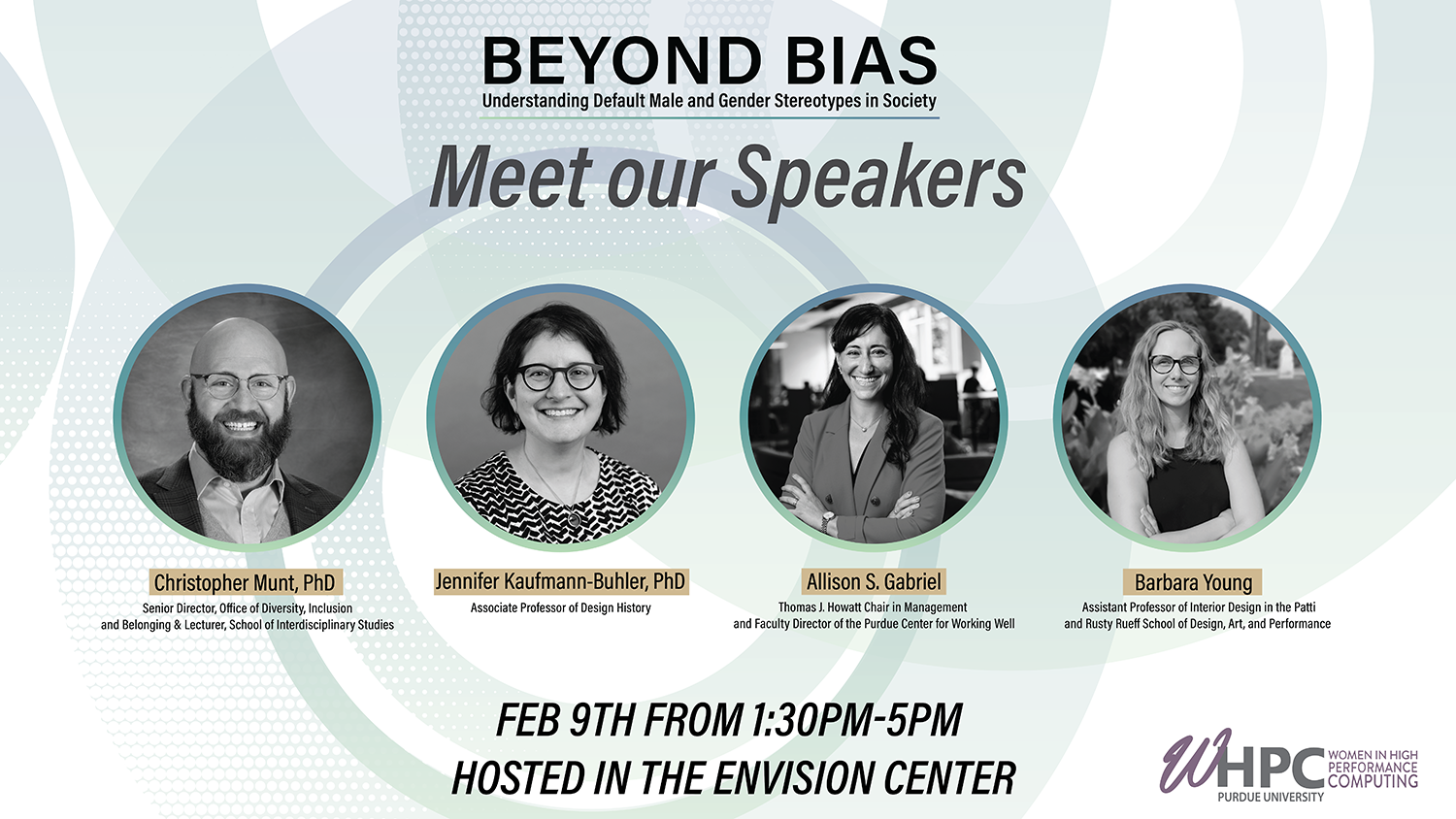Purdue Women in HPC hosting February workshop on gender stereotypes, bias
Purdue’s Women in High-Performance Computing (WHPC) group is hosting a workshop on February 9 from 1:30-5 p.m. at the Envision Center about the “default male” phenomenon and the pervasive influence of gender stereotypes based on the book “Invisible Women: Data Bias in a World Designed for Men” by Caroline Criado Perez.
The workshop will feature four 30 minute presentations from Purdue faculty members, followed by a panel discussion with audience Q&A. There will be a networking event before the conference from noon to 1 p..m. in STEW. Additional details about the networking event will be available closer to the workshop date.
Registration is free, but interested participants should register in advance here. Please make sure to indicate whether you plan to attend the networking event.

The speakers include:
-
Allison S. Gabriel, Thomas J. Howatt Chair in Management and Faculty Director of the Purdue Center for Working Well, “Understanding Working Women’s Lives: An Exploration of Hidden Challenges of Postpartum in Organizations.”
- Abstract: Many women experience psychological and emotional challenges during their transition to becoming a working mother, making the reentry process after parental leave crucial for helping women thrive at work and at home. Within this talk, I will highlight my research on women’s postpartum experiences and their intersection with work, covering an evolution of topics related to breastfeeding in the workplace, postpartum depression, and postpartum allyship. Across these papers, I aim to bring theoretical and practical attention to how to best support working mothers, highlighting how “ideal worker norms” often place women in a position of limited support and guidance during this critical career period.
-
Barbara Young, assistant professor of interior design in the Patti and Rusty Rueff School of Design Art and Performance, “Participation, Inclusion and Human Understanding: Feminist Practices of Interior Design.”
- Abstract: The reality of working in a gendered profession comes with an increased burden to explain the role, value, and boundaries of my work. There is a propensity, internally and externally, to compare the feminine form to its male counterpart, which is always read as superior. These conversations tend toward a demonstration that we are ‘as good as’ in skill or technical prowess. Through comparison, however, the dominant-superior posturing is never surpassed. Instead, I prefer to play to the unique strengths of my perspective as a woman and celebrate what it means to design the built environment through that lens. While this means different things in different situations, it generally centers on design as a process that includes multiple voices, is subjective, care oriented, and respects a persons’ agency during and after the project is complete. I will briefly discuss the Interior Design process that is not simply object-orientated, but also dialogic and attempts to be inclusive of physical, cognitive, and cultural difference in public spaces.
-
Christopher Munt, senior director, Office of Diversity, Inclusion and Belonging, and lecturer, School of Interdisciplinary Studies, “Bias and the Gender Binary: How Limited Thinking about Sex/Gender Reinforces Unconscious Social Bias.”
- Abstract: In mathematics and computer code, using the term “binary” means that there are two (and only two) options, which are mutually exclusive (for example, “1s and 0s”, “on and off”, etc). In the case of gender, such binaristic thinking is often critiqued by those who do not identify with the terms “man” or “woman.” However, the gender binary has negative effects even for those who do identify with those categories. This short talk will demonstrate the crucial role that the gender binary plays in preserving gender stereotypes and will encourage attendees to manage bias in their own lives by thinking differently about sex and gender.
-
Jennifer Kaufmann-Buhler, associate professor of design history, “Sexism by Design.”
- Abstract: This talk will focus on the history of sexism in design practice particularly as it relates to the history of office design in the United States, and the legacy of this historic sexism in modern day workplaces.
Purdue WHPC is part of a broader engagement initiative by the Rosen Center for Advanced Computing (RCAC), and is led by women staffers affiliated with RCAC. WHPC is a diverse community encompassing undergraduate, graduate, staff and faculty men and women who are interested in exposing women to high-performance computing and encouraging their pursuit of research and careers in HPC and other technology fields.
Purdue WHPC organizes a range of activities including a scholarship program that supports travel for women students to industry conferences, regular meetings to discuss technical HPC-related issues of interest, opportunities to network with the WHPC community, a mentorship program, workshops, and exposure to external resources and opportunities.
To learn more about Purdue Women in HPC or be added to the mailing list, contact whpcinfo@lists.purdue.edu.
